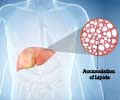A new study has said that atherosclerosis is not only harmful to the arteries, it also hurts other organs like the liver because of adverse biochemical reactions with the plaques.
This breakthrough study has claimed that the effects of the disease are more widespread than previously believed, and may have implications in finding new targets for developing drugs for preventing or reducing these chemical changes associated with heart disease."Our findings add new knowledge to the big melting pot of this complex disease called atherosclerosis. I anticipate that future research will establish whether the harmful protein modifications we observed in animal organs can be prevented and provide the basis of new treatments for the disease," said study leader Rita Upmacis, Ph.D., a chemist at Weill Medical College of Cornell University in New York.
In order to determine the root causes of the disease, the scientists focused on the interaction between certain highly reactive nitrogen molecules and proteins. Under certain conditions, this interaction produces nitrotyrosine, which has been linked to Alzheimer's, arthritis, cancer, and other disorders, but little is known about its role in atherosclerosis.
In the new study, the scientists found that mice genetically prone to atherosclerosis and fed a high-fat diet, developed high levels of nitrotyrosine in their heart, lung, liver, and kidney, unlike mice that were fed regular diets.
The scientists said that the rise in nitrotyrosine levels indicate that high-fat diets in animals with atherosclerosis can help trigger nitrotyrosine accumulation in the proteins of various organs.
The team conducted a similar experiment in atherosclerotic mice lacking the gene that makes nitric oxide synthase (iNOS), an enzyme that orchestrates accumulation of nitrotyrosine in proteins. Supporting earlier finding that iNOS gene deletion limits the formation of atherosclerotic plaques; the new study showed that nitrotyrosine accumulation in proteins is reduced in diverse organs when iNOS is absent.
Advertisement
However, the scientists claim that the accumulation of nitrotyrosine in the blood can act as a diagnostic test to track atherosclerosis and give a clearer picture of damage to organs.
Advertisement
Source-ANI
RAS /J











